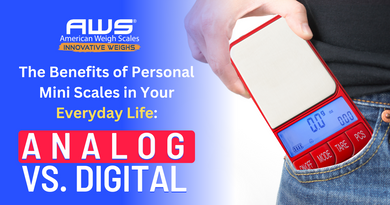In today's world of counting calories, points, grams, and ounces, personal mini scales can make a big difference in managing your health and wellness goals. Having an accurate, portable scale on hand gives you the flexibility to weigh food, liquids, ingredients, and other items anywhere life takes you. But should you choose an analog mini scale with a traditional dial readout or go digital? Each option has advantages. In this article, we'll break down the key benefits of personal mini scales for everyday use and discuss the pros and cons of analog and digital models to help you decide which is best for your needs.
Benefits of Personal Mini Scales
It's easy to incorporate a mini scale into your routine and reap the rewards:
- Monitor nutrition and calories. Weigh food to get accurate nutrition data for meal prep, dieting, calorie counting, macros, and more.
- Portion control. Weighing portions helps you eat and serve proper amounts for health goals.
- Consistent baking and cooking. Weigh ingredients like flour, sugar, coffee, and herbs for consistency.
- Manage diabetes. Carefully weigh carbohydrate-heavy foods as part of a diabetic diet.
- Save money. Weigh items accurately to avoid overpaying when food is priced per pound/gram.
- Track packages. Know shipping weights to avoid unexpected fees.
- Make precision mixtures. Properly weigh components like oils for DIY cosmetics and cleaning products.
- With a mini scale on hand, you can weigh items anywhere - at home, work, or on vacation - for convenience and accuracy.
Analog Mini Scales: The Original User-Friendly Option
Analog mini scales operate mechanically, showing the weight by the position of a dial arrow. Here are the pros of analog scales:
- No batteries required. Analog scales never need charging or battery replacement.
- Easy to use. Simply place the item and read the dial - no buttons to press.
- Durable build. Analog scales contain fewer electronic components to break.
- Affordable price. Analog scales are simple to produce, keeping costs down.
- Analog scales excel at basic weighing tasks. The limitations include:
- Lower precision. Dial displays often rounded to increments of 1 gram or more.
- Manual reading. You must read and interpret the position of the dial arrow.
- No unit conversion. Can only display one set unit, like ounces or grams.
- Harder to read. Dials can be trickier to read accurately, especially for small measurements.
- While excellent for basic needs, analog scales lack some of the advanced features and precision of digital scales.
Digital Mini Scales: Modern Accuracy and Convenience
Digital mini scales provide an electronic, numerical readout of the weight. Here are the advantages of digital scales:
Highly accurate. Digital scales can detect much smaller increments, down to 0.1g or 0.005 oz.
- Easy to read. Numbers are clear and definitive.
- Unit conversion. Easily switch displayed units with a button press.
- Auto-off. Digital scales run on battery and automatically power down after use.
- Compact design. Digital scales use smaller, modern components.
- Additional features. May include tare/zeroing, auto calibration, and memory recall.
- The limitations of digital scales include:
- Requires batteries. You'll need to replace/recharge batteries over time.
- More fragile. The electronic components are vulnerable if dropped.
- Higher cost. Digital scales are more expensive to manufacture.
- For precision, versatility, and advanced features, digital scales are ideal. The drawback is their dependence on batteries and electronics.
Choosing the Best Mini Scale for You
When selecting a personal mini scale, consider these factors:
Accuracy needs - if you only occasionally need ballpark figures for non-critical purposes like portioning meals, an analog scale will serve you well. For nutrition tracking, baking, and other uses requiring precision, go digital.
Ease of use - if you want quick, simple weighing with no setup, analog mechanical operation is hard to beat. But for tech-savvy users, digital scales offer more functionality.
Power requirements - if you don't want to worry about batteries, analog is preferred. Digital provides more versatility in locations.
Budget - analog scales are more affordable, while highly accurate digital models come at a higher price.
Visual acuity - if you struggle to read smaller dial markings, digital NUMERICAL readouts will be easier to see.
The right mini scale comes down to your individual needs and lifestyle. Evaluate what features matter most before deciding between analog and digital. With a compact, portable scale in your toolbox, you'll have the freedom to measure and monitor on the go as you pursue your nutrition, health, and wellness goals each day.

